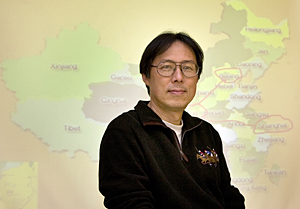

- Rozovsky wins prestigious NSF Early Career Award
- UD students meet alumni, experience 'closing bell' at NYSE
- Newark Police seek assistance in identifying suspects in robbery
- Rivlin says bipartisan budget action, stronger budget rules key to reversing debt
- Stink bugs shouldn't pose problem until late summer
- Gao to honor Placido Domingo in Washington performance
- Adopt-A-Highway project keeps Lewes road clean
- WVUD's Radiothon fundraiser runs April 1-10
- W.D. Snodgrass Symposium to honor Pulitzer winner
- New guide helps cancer patients manage symptoms
- UD in the News, March 25, 2011
- For the Record, March 25, 2011
- Public opinion expert discusses world views of U.S. in Global Agenda series
- Congressional delegation, dean laud Center for Community Research and Service program
- Center for Political Communication sets symposium on politics, entertainment
- Students work to raise funds, awareness of domestic violence
- Equestrian team wins regional championship in Western riding
- Markell, Harker stress importance of agriculture to Delaware's economy
- Carol A. Ammon MBA Case Competition winners announced
- Prof presents blood-clotting studies at Gordon Research Conference
- Sexual Assault Awareness Month events, programs announced
- Stay connected with Sea Grant, CEOE e-newsletter
- A message to UD regarding the tragedy in Japan
- More News >>
- March 31-May 14: REP stages Neil Simon's 'The Good Doctor'
- April 2: Newark plans annual 'wine and dine'
- April 5: Expert perspective on U.S. health care
- April 5: Comedian Ace Guillen to visit Scrounge
- April 6, May 4: School of Nursing sponsors research lecture series
- April 6-May 4: Confucius Institute presents Chinese Film Series on Wednesdays
- April 6: IPCC's Pachauri to discuss sustainable development in DENIN Dialogue Series
- April 7: 'WVUDstock' radiothon concert announced
- April 8: English Language Institute presents 'Arts in Translation'
- April 9: Green and Healthy Living Expo planned at The Bob
- April 9: Center for Political Communication to host Onion editor
- April 10: Alumni Easter Egg-stravaganza planned
- April 11: CDS session to focus on visual assistive technologies
- April 12: T.J. Stiles to speak at UDLA annual dinner
- April 15, 16: Annual UD push lawnmower tune-up scheduled
- April 15, 16: Master Players series presents iMusic 4, China Magpie
- April 15, 16: Delaware Symphony, UD chorus to perform Mahler work
- April 18: Former NFL Coach Bill Cowher featured in UD Speaks
- April 21-24: Sesame Street Live brings Elmo and friends to The Bob
- April 30: Save the date for Ag Day 2011 at UD
- April 30: Symposium to consider 'Frontiers at the Chemistry-Biology Interface'
- April 30-May 1: Relay for Life set at Delaware Field House
- May 4: Delaware Membrane Protein Symposium announced
- May 5: Northwestern University's Leon Keer to deliver Kerr lecture
- May 7: Women's volleyball team to host second annual Spring Fling
- Through May 3: SPPA announces speakers for 10th annual lecture series
- Through May 4: Global Agenda sees U.S. through others' eyes; World Bank president to speak
- Through May 4: 'Research on Race, Ethnicity, Culture' topic of series
- Through May 9: Black American Studies announces lecture series
- Through May 11: 'Challenges in Jewish Culture' lecture series announced
- Through May 11: Area Studies research featured in speaker series
- Through June 5: 'Andy Warhol: Behind the Camera' on view in Old College Gallery
- Through July 15: 'Bodyscapes' on view at Mechanical Hall Gallery
- More What's Happening >>
- UD calendar >>
- Middle States evaluation team on campus April 5
- Phipps named HR Liaison of the Quarter
- Senior wins iPad for participating in assessment study
- April 19: Procurement Services schedules information sessions
- UD Bookstore announces spring break hours
- HealthyU Wellness Program encourages employees to 'Step into Spring'
- April 8-29: Faculty roundtable series considers student engagement
- GRE is changing; learn more at April 15 info session
- April 30: UD Evening with Blue Rocks set for employees
- Morris Library to be open 24/7 during final exams
- More Campus FYI >>
3:15 p.m., June 17, 2009----The U.S. Department of State has selected the University of Delaware to host the National Security Language Initiative for Youth (NSLI-Y) Summer Institute in Shanghai, China.
The highly competitive program, funded by a $225,360 grant and co-directed by Jianguo Chen, associate professor of Chinese Studies, and Maria Tu, assistant professor of Chinese, in the Department of Foreign Languages and Literatures at the University of Delaware, is designed to immerse 24 academically talented high-school students from across the United States in the language and culture of China through an intensive program in China's megacity from June 18 to July 30.
The program is conducted in partnership with UD's Center for International Studies. Additionally, the University's Academic and Student Affairs Council is supporting the program by funding a program assistant, Matt Shaffer, a recent UD graduate.
“The ultimate goal of the program is to encourage young Americans to learn about Chinese language and culture to inspire future generations to be active participants in the international community and foster the development of future diplomats,” said Chen, who secured the grant.
More than 700 high-school students, ages 16 to 18 years old, were recruited by the State Department to apply for the NSLI-Y program through a partnership with American Councils, one of the largest associations for international education in the United States.
The 24 students selected for the program, through several rounds of competition, are all high-school seniors. They hail from Alabama, California, Connecticut, Georgia, Kansas, Maine, Maryland, Michigan, Minnesota, New Jersey, New York, North Carolina, Ohio, Oregon, Pennsylvania, South Carolina, South Dakota, Tennessee, Vermont, Washington, Washington, D.C., and Wisconsin. The students were chosen based on teachers' recommendations, grade point average, an application essay, and level of proficiency with the Chinese language.
The students will live with a Chinese family in Shanghai, receive intensive Chinese language instruction, and attend guest lectures by novelists, filmmakers, musicians, artists, and martial artists at East China Normal University, UD's partner university and a top teacher training institution in China.
A special focus of the program will be women's issues, and several Chinese women activists are scheduled to present to the students. Additionally, there will be an emphasis on tradition and transformation to modern China, with a closer look at pop culture, said Chen, whose expertise is in Chinese and comparative literatures and film studies.
The program includes an extended trip to Beijing, the capital, where the students will tour the Forbidden Palace and Temple of Heaven and visit the Great Wall and other historical and cultural sites. Other excursions include the garden city of Suzhou and the waterborne township of Zhouzhuang.
As the program's language director, Maria Tu will oversee 120 hours of in-class instruction provided to the students, who will be immersed in language training from 8:30 in the morning until noon nearly every day of the 41-day program. In the afternoon, the students will receive individual language tutoring by a Chinese student of similar age for one-and-one-half hours. The students also pledge to practice speaking Chinese with their host family for an hour after school and assist the host family in practicing English.
“The key is cross-cultural communication,” Chen said. “We want both sides to benefit.”
Community service is also an important element of the program, according to Chen. In the Delaware Governor's School for Excellence in China, which Chen directed in 2007 and 2008, participating students were involved in an environmental cleanup, assisted with preparations for the Olympic Games, and helped victims of the 2008 Sichuan Earthquake.
“Last summer, we organized a party for 100 orphans of the Sichuan earthquake, whom we met in Tiananmen Square,” Chen said. “We raised money and prepared a bag of gifts for each child, including making paper cranes, which is a gesture of goodwill. Some of our students sang songs, while others entertained by teaching simple English. A TV station broadcast the story nationwide in China,” Chen noted.
The program will be evaluated extensively at various stages by the State Department, American Councils, and by UD, Chen said. Additionally, at the conclusion of the program, each participating student is required to deliver at least one presentation to peers, at church, or in their local community about their China experience.
“This program is good for the University and for the nation,” Chen said. “We want it to be a truly national program, promoting understanding between the two countries, and one that we can be proud of,” he noted.
In the future, Chen said, he hopes to establish a permanent national center focusing on Chinese language and culture at UD, as part of the University's increasing globalization efforts highlighted in the Path to ProminenceTM strategic plan.
Article by Tracey Bryant




